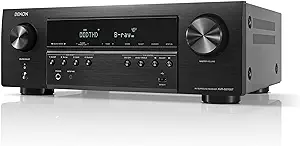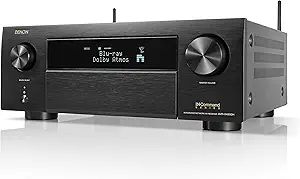Denon and Yamaha are two of the most prominent brands when it comes to audio/video receivers, each with their unique strengths and technological advancements. Denon AV receivers are known for their exceptional sound quality, thanks to their proprietary AL32 Processing technology and monolithic amplifier design. The latest models, such as the Denon AVR-X3700H, come equipped with 8K/60Hz and 4K/120Hz pass-through, Dolby Atmos, DTS:X, and Auro-3D for a fully immersive home theater experience. However, some users have reported that Denon's user interface can be a bit complex to navigate, particularly for those who are not tech-savvy. On the other hand, Yamaha AV receivers, like the Yamaha RX-V6A, are celebrated for their MusicCast multi-room audio technology, which allows for seamless streaming and sharing of music throughout your home. Yamaha also incorporates Surround:AI technology in their receivers, which automatically adjusts audio levels in real-time for optimal sound performance. However, Yamaha's receivers have been noted to lack the advanced room correction software found in some of their competitors, which could affect the overall sound quality in certain room setups. .
Product Selection
Denon AV Receivers and Yamaha AV Receivers are both leaders in the audio/video receivers market, each offering a wide range of products to cater to different user needs and preferences. Denon, for instance, is known for its AVR-X and AVR-S series, which are packed with the latest technologies such as Dolby Atmos, DTS:X, and Auro-3D for immersive surround sound experience. They also support 4K Ultra HD, HDR, and HDCP 2.2 for enhanced video quality. Yamaha, on the other hand, offers the Aventage and RX-V series, which also support Dolby Atmos and DTS:X, as well as MusicCast multi-room technology for seamless audio streaming throughout the home. In terms of product selection, both brands offer a range of options from entry-level to high-end models, but Denon tends to have a slight edge in terms of the number of models available. This gives consumers more choices to find a receiver that fits their specific needs and budget. Yamaha, however, is often praised for the build quality and longevity of their receivers, which could make them a more appealing choice for consumers looking for a long-term investment. Both brands also offer models with network connectivity options, including Wi-Fi and Bluetooth, for easy integration with other devices and online streaming services. However, it's worth noting that while both brands support popular streaming services like Spotify and Pandora, only Denon supports Apple's AirPlay 2, which could be a deciding factor for some Apple users.
Design/Look
Denon AV Receivers and Yamaha AV Receivers are both renowned in the audio equipment industry for their superior sound quality and advanced features. However, their design and look significantly differ, providing unique aesthetic value to users. Denon AV Receivers are known for their sleek, modern design with a minimalist approach. The latest models, such as the Denon AVR-X3700H, feature a clean front panel with a matte finish, a large central display, and neatly organized buttons and knobs. The design is uncluttered and intuitive, making it easy for users to operate. The color schemes are usually black or silver, giving it a sophisticated look that blends well with other home theater components. On the other hand, Yamaha AV Receivers, like the Yamaha RX-V6A, have a more futuristic design. They are characterized by a bold, angular look with a glossy finish. The front panel is mostly covered by a large LED display, with only a few touch-sensitive buttons and a large, centrally located volume knob. The design is more intricate and might appeal to users who prefer a more high-tech look. However, the glossy finish may attract fingerprints and dust more easily than Denon's matte finish. Both brands offer a unique aesthetic appeal, and the choice between them would largely depend on personal preference and the existing decor of your home theater setup.
Price
Denon and Yamaha are both reputable brands in the audio/video receiver market, and their pricing structures reflect their commitment to quality and advanced technology. Denon AV receivers are known for their high-end features and superior sound quality, which come at a premium price. The latest models, such as the Denon AVR-X3700H, are equipped with 8K HDMI support, 3D audio formats like Dolby Atmos, and advanced room correction software. However, these features come with a hefty price tag, making Denon a more expensive option compared to other brands. On the other hand, Yamaha AV receivers offer a more affordable range of products without compromising on the quality of sound and features. The recent models like the Yamaha RX-V6A also support 8K HDMI and 3D audio formats, but at a lower price point than Denon. Yamaha also offers MusicCast multi-room audio and voice control via Alexa and Google Assistant, which adds value for the price. However, some users have noted that Yamaha's room correction software is not as advanced as Denon's. Therefore, while Yamaha offers a more budget-friendly option, it might not deliver the same level of refinement in certain features as Denon.
Quality/Durability
Denon and Yamaha are both reputable brands in the audio equipment industry, known for their high-quality AV receivers. When it comes to quality and durability, both brands have their unique strengths. Denon AV receivers are renowned for their excellent sound quality, with their latest models featuring advanced technologies like Dolby Atmos, DTS:X, and Auro-3D. These technologies provide a more immersive audio experience, enhancing the overall quality of the sound. Denon receivers are also built to last, with robust construction and high-quality components that ensure long-term durability. On the other hand, Yamaha AV receivers are also known for their superior sound quality and durability. Yamaha's latest models are equipped with technologies such as MusicCast Surround and Dolby Atmos, offering a rich and immersive sound experience. Yamaha receivers are also designed to withstand the test of time, with a sturdy construction and high-grade components. One advantage of Yamaha over Denon is their proprietary YPAO sound optimization technology, which analyzes the room acoustics and adjusts the audio accordingly for the best sound performance. However, some users have reported that Yamaha's user interface is not as intuitive as Denon's, which might affect the ease of use. In comparison to other brands, both Denon and Yamaha hold their ground in terms of quality and durability, making them a reliable choice for audio enthusiasts.
Reputation
Denon and Yamaha are both highly reputable brands in the audio/video receiver market, each boasting a history of producing high-quality products. Denon, a Japanese company, has been in the industry for over a century and is known for its innovation and use of the latest technologies. For instance, Denon's AVR-X series receivers are praised for their support of 8K resolution, 3D audio formats, and HEOS built-in for multi-room streaming. However, some users have reported issues with the user interface and setup process, indicating that it may not be as user-friendly as some of its competitors. On the other hand, Yamaha, another Japanese brand, has a reputation for reliability and longevity. Its AVENTAGE series of AV receivers is well-regarded for its high-quality audio performance, and the brand's MusicCast technology provides versatile multi-room audio capabilities. Yamaha receivers are also known for their user-friendly interface and easy setup process, which is a significant advantage for those who may not be as tech-savvy. However, some users have reported that Yamaha receivers may not offer as many features as other brands in the same price range. In terms of brand reputation, both Denon and Yamaha are highly respected, but they each have their strengths and weaknesses.
Warranty
Denon and Yamaha are both renowned brands in the audio equipment industry, and their AV receivers are highly regarded. When it comes to warranty, both brands offer competitive coverage, but there are slight differences. Denon AV receivers come with a 3-year warranty, which covers parts and labor for repairs. This warranty is quite comprehensive and provides consumers with a significant amount of protection. It is also worth noting that Denon has a reputation for excellent customer service, which can be crucial if any issues arise during the warranty period. On the other hand, Yamaha AV receivers come with a 2-year warranty, which is slightly shorter than Denon's. However, Yamaha's warranty also covers parts and labor for repairs. Yamaha is known for its durable and reliable products, so even though the warranty period is shorter, the likelihood of needing repairs may be lower. In comparison to other brands, both Denon and Yamaha offer longer warranty periods, as many other brands in the audio equipment industry only offer a 1-year warranty. Therefore, both Denon and Yamaha provide added value to their customers through their warranty policies.
Conclusion
Denon and Yamaha are both reputable brands in the audio/video receivers market, each with its own strengths and unique features. Denon AV receivers are known for their excellent sound quality and advanced features. The latest models are equipped with technologies like Dolby Atmos, DTS:X, and Auro-3D, which provide immersive sound experiences. They also support 8K/60Hz and 4K/120Hz pass-through, offering an enhanced viewing experience. However, Denon receivers often come with a higher price tag, which may not be ideal for budget-conscious consumers. On the other hand, Yamaha AV receivers are also highly regarded for their sound quality and durability. They come with MusicCast Surround technology that allows wireless surround sound setup, which is a plus for those who want to avoid clutter from wires. Yamaha receivers also support Dolby Atmos and DTS:X, but they lack Auro-3D support. One advantage of Yamaha receivers is their user-friendly interface, which makes setup and operation easier for users. However, some users have reported that Yamaha receivers may not deliver as much power as Denon receivers. In comparison to other brands, both Denon and Yamaha offer a good balance of sound quality, features, and price, making them popular choices among consumers.



















